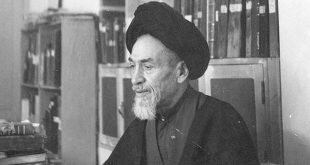
Qazi Nurullah Shustari entitled Zia-ud-Din known as Shaheed-i-Thalis was born in 956 A.H./1549 A.D. at Shushtar, one of the cities of the present Khuzistan province in South of Iran.Family
He was sayyid by lineage and belonged to the Mar’ashi family. His father was Sayyid Sharif-ud-din and grandfather Sayyid Zia-ud-Din Nurullah.
Qazi Nurullah had five sons. All of them were men of learning. Among them Sayyid Ala-ul-Mulk produced many literary works. He was appointed the teacher of Prince Muhammad Shuja (1616 – 1660 A.D.) by Mughal emperor Shahjahan (1628 A.D.). His other son Ala’- ud’ Dowlah was a renowned calligrapher. Martyrdom of Qazi Nurullah and his tomb: -After the death of Mughal emperor Akbar (1605 A.D.) the bigoted group again rose to power at the imperial court.Education
He got his early education at home from his father and the other teachers at town.
Teaching
Qazi Nurullah also proved to be an unprejudiced teacher and many Ulama who belonged to Sunnite and Shi’ite schools attended his lectures to acquire knowledge in the field of jurisprudence.
Emigration to Mashhad
After completion of it in the year 979 A.H., he went to Mashhad, the holy city in the Khurasan province. Qazi Nurullah lived in the city for fifteen years and completed his education there under the guidance of the profound masters of their subjects like Abdul Waheed Shushtari and many others.
Emigration to India
Qazi Nurullah came to India in the year 992 A.H./1584 A.D. and was introduced to Mughal emperor Jalalud Din Akbar in the year 963 A. H./ 1556 A.D . by Hakim Abul Fath Gilani(d.997 A.H./1589 A.D.) and became one of the close associates of the emperor, who appointed him grand vizier and the chief justice of the empire . In judiciary department, he performed his duties so unbiased that even his sectarian opponents admitted of his equity, justice, fairness, honesty, nobility, modesty, piety, tolerance, wisdom, wittiness and his proficiency over various school of jurisprudence. Qazi Nurullah Shushtari as a jurist and theologian of high-ranking position took great pains to defend the realms of religion and became one of the famous religious reformers of his age. He was the only jurist who passed legal verdicts based on the four Sunni schools of law besides Fih-e-Jafari. Qazi while refuting any arguments used very polite and humane language based on logic and proofs and his method resembles the modern method of historical proofs methodology. All his discourses and works are completely free from sectarian bigotry and prejudice and are wholly based on logical proofs from the Holy Qur’an and the traditions of the Holy Prophet of Islam (S.A.W.).
Martyrdom
He was martyred on 18th Jamadi al-Thani in 1019 A.H./ 1610 A .D. for the reason that the he differed in his belief with the majority of the people and the bigoted group at the court of Jahangir (1605 – 1627 A.D.), the successor of Akbar.
His tomb, which is at Agra, has been the center of pilgrimage since the day of his martyrdom. Poets praised him in their literary compositions in his lifetime and even after his martyrdom. Besides that many of his works with the description of his life have been translated into Arabic, Persian and Urdu.
Qazi Nurullah, a dynamic religious reformist scholar, philosopher and jurist had written 140 books and treatises on different branches of science and religion. Some of them are:
– Ahqaq-ul-Haq (Justification of the Truth): In this work he has defended the beliefs of Shi’ite faith.
-Majalis-ul-Mo’mineen (The Assembly of the faithfuls): Gives the description of the religious scholars and the other learned men.
-Risala-i-Jalaliyyah: A treatise dedicated to Jalal- ud-Din Akbar, the Mughal emperor of Hindustan. It consists of knowledge. Marginal notes on several books like Shamsiya written about logic.
-Sharh-i-Tajrij is regarding scholastic theology.
-Khulasa-tul Aqwal: Deals with the biographies.
-Sharh-i-Chaghmini: is on astronomy.
-Tahrir-i-Uqlidas: is on geometry.
-Sharh-ul-Hidaya: is on philosophy.
-Sharh-i-Waqaya and Hidaya: both these works are on Hanafi School of jurisprudence.
-Sharh-i-Aqa’ id-i-Nasafi: is on the theology of the Sunnite Muslims.
-Sharh-i-Mukhtasar-i-A’zdi: is on the principles of the jurisprudence dealing with Sunnite Muslims.
-Do Risala (two treatises): one of them is a commentary on the verses of the Glorious Quran related to the unity of God (Tawheed). The other is also a commentary dealing with the verses of the Glorious Quran related to sanctification of the Holy Ahlul Bayat (A. S.)
-Risala Dar Bab-i-Wujud: a treatise on the existence.
-Risala Dar Sharh-i-Rubayi – i Abu Sa’id Abul Khair: a treatise in which one of the quatrains or the Sufi poet Abu Sa’id Abul Khair has been elaborated. An intricate review on the commentary written by Shaykh Faizi.
-Risala Dar Bab-i-Qaza O’ Qadar: treatise on free will and determinism. -Commentaries on Tahzib- ul-Ahkam: are related to the traditions of the Prophet Muhammad (S. A.W) and jurisprudence. These are the detailed explanations of judgments based on the traditions of the Holy Prophet Muhammad (S. A.W) and the Islamic jurisprudence.
-Tashrih-ul-Aflak: deals with astronomy.
-Muqaddima-i-Masabih: is related to the traditions of the Holy Prophet Muhammad (S.A.W) quoted by the Sunnite Muslims.
-Risala Dar Munazira-i-Gul O’ Sunbul: a treatise on the dispute between the flower and the hyacinth.
-Risala-i-Munsha’at: a treatise on writings and compositions. Beside the above-mentioned books and treatise he has also several other literary works.Compositions
Qazi Nurullah had excellent literary expertise and was profound in producing beautiful literary pieces in Arabic and Persian. His compositions in both languages are eloquent and full of fluency. He also composed verses in both the languages that number about three thousand. Some of them are still preserved in various books and treatises.
 Ijtihad Network Being Wise and Faithful Muslim in the Contemporary World
Ijtihad Network Being Wise and Faithful Muslim in the Contemporary World
